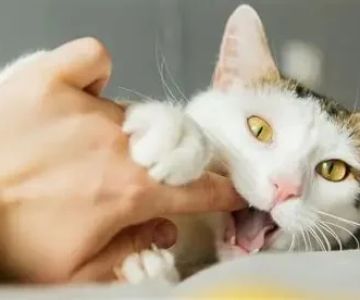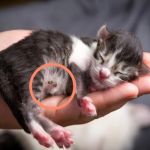
- 1. Understanding Your Kitten's Whiskers
- 2. How to Identify a Broken Whisker
- 3. Why a Broken Whisker Can Be Concerning for a Kitten
- 4. Steps to Help a Kitten with a Broken Whisker
- 5. When to See a Veterinarian for a Broken Whisker
1. Understanding Your Kitten's Whiskers
Whiskers are an essential part of a kitten's sensory system. These specialized hairs, also known as vibrissae, are not just for decoration; they help your kitten navigate their surroundings by sensing air currents and objects nearby. Whiskers are highly sensitive and are deeply embedded in the skin, making them a critical tool for kittens, especially in the early stages of development. They use them to judge spaces, assess distances, and even detect changes in their environment.
2. How to Identify a Broken Whisker
Unlike fur, whiskers are much thicker and sturdier, but they can still break or get damaged. A broken whisker may not be immediately noticeable unless you are closely examining your kitten’s face. Here are a few signs to look for:
- Shortened whisker: If one whisker is significantly shorter than the others, it may have been broken.
- Frayed ends: A broken whisker can often have a frayed or split tip.
- Behavioral changes: If your kitten seems clumsy or is having difficulty navigating around obstacles, it could be due to the loss of sensory feedback from a broken whisker.
- Bleeding or scabbing: In some cases, a whisker may be broken at the base, which could cause a small amount of bleeding or scabbing.
3. Why a Broken Whisker Can Be Concerning for a Kitten
Whiskers are crucial to a kitten’s ability to explore and interact with their environment. A broken whisker can impair their depth perception and spatial awareness, making it harder for them to judge distances or safely navigate tight spaces. While a single broken whisker might not cause long-term issues, repeated injuries or the loss of multiple whiskers could affect your kitten's development and confidence.
Additionally, because whiskers are connected to highly sensitive nerves, any damage could cause discomfort or pain, which might lead to behavioral changes, such as increased irritability or avoidance of certain activities.
4. Steps to Help a Kitten with a Broken Whisker
If you suspect that your kitten has a broken whisker, here are the steps you can take to help:
- Examine the injury: Carefully inspect the whisker and the surrounding area. If you see visible damage, such as fraying, or if there is any bleeding, gently clean the area with warm water.
- Keep the area clean: Use a mild antiseptic or saline solution to clean the base of the broken whisker, but avoid using harsh chemicals or ointments that could irritate the sensitive skin.
- Observe for discomfort: If your kitten shows signs of discomfort or behavioral changes, it’s important to monitor them closely for the next few days. Ensure they are still eating, drinking, and playing normally.
- Offer extra support: If the whisker is broken at the base or there is scabbing, you can offer extra support by providing a comfortable space where they can rest undisturbed and recover.
5. When to See a Veterinarian for a Broken Whisker
In most cases, a broken whisker will heal on its own without the need for medical intervention. However, there are certain situations where you should seek veterinary help:
- Multiple broken whiskers: If several whiskers are damaged or lost, it could indicate an underlying issue that needs professional attention.
- Persistent bleeding or swelling: If the base of the whisker or the surrounding skin becomes infected or doesn’t heal after a few days, it’s important to consult a vet.
- Behavioral changes: If your kitten becomes disoriented, lethargic, or shows signs of pain, it could be due to the injury, and a vet should evaluate the situation.
For more tips on how to care for your kitten and to find the right products for their health and well-being, visit Omnia Pet for the best kitten care supplies and advice.









 Hollywood Feed4.0 (184 reviews)
Hollywood Feed4.0 (184 reviews) Brew Biscuits5.0 (2 reviews)
Brew Biscuits5.0 (2 reviews) All Friends Animal Hospital4.0 (446 reviews)
All Friends Animal Hospital4.0 (446 reviews) Kittylandkittens LLC0.0 (0 reviews)
Kittylandkittens LLC0.0 (0 reviews) Village Animal Clinic4.0 (212 reviews)
Village Animal Clinic4.0 (212 reviews) Rift Lake Aquatics4.0 (165 reviews)
Rift Lake Aquatics4.0 (165 reviews) Understanding Pet Insurance: What Does It Actually Cover?
Understanding Pet Insurance: What Does It Actually Cover? How to Keep Your Kitten's Eyes Clean and Free of Discharge
How to Keep Your Kitten's Eyes Clean and Free of Discharge The Truth About Heartworm Disease: Prevention is Cheaper Than Cure
The Truth About Heartworm Disease: Prevention is Cheaper Than Cure Why Is My Kitten's Belly Button Showing? | Omnia Pet
Why Is My Kitten's Belly Button Showing? | Omnia Pet Why Does My Cat Bite Me Gently? Love Bites Explained
Why Does My Cat Bite Me Gently? Love Bites Explained How to Stop Your Kitten from Getting into Cabinets
How to Stop Your Kitten from Getting into Cabinets